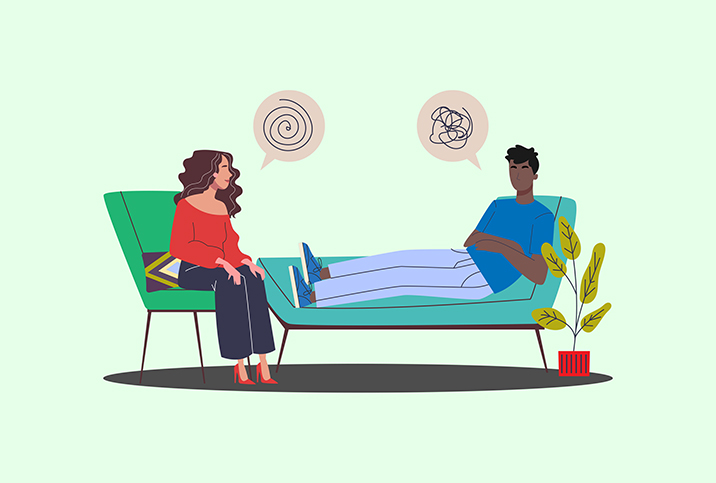Help! My Partner Is Treating Me Like a Therapist

The hallmark of a good therapist is being able to tell them your thoughts and feelings without being judged. It's one of the reasons therapy has the power to help people heal and grow.
Sometimes your partner might expect the same level of support from you. After all, a partner is someone you can trust and lean on during difficult times. But no matter a relationship's dynamic, your partner is not your therapist. So where should you draw the line between a partner confiding in you and treating you as a substitute for therapy?
"If you are constantly feeling drained when you are helping or don't feel heard or supported, that is a red flag," said Hillary Schoninger, L.C.S.W., an individual and family psychotherapist in Chicago. "Healthy relationships based on reciprocity allow the needs and wants of everyone to be considered."
How does a partner's support differ from a therapist's?
Daryl Appleton, Ed.D., M.Ed., a psychotherapist and work-life balance expert in New York City, said being a supportive partner involves "consistency in showing up, taking time to learn your love language, having healthy arguments or physically being there to cheer you on or give you a hug."
She explained that it's your partner's responsibility to know what kind of support they need so they can best communicate with you. One way to frame this conversation is to clarify whether your partner is looking for advice or just needs to vent.
"A supportive partner listens to you and is emotionally available when you need him or her," said Laura Doyle, a relationship coach in California.
Partners recognize and respect each other's boundaries, which includes giving each other space and taking responsibility for their own happiness. In a relationship, there needs to be room for both partners' feelings and problems.
"The nature of support in therapy is I put my issues aside to make room for yours," Appleton said.
However, even therapists can't provide this kind of support to their own partners.
"We are too close to the situation to consider the whole picture," Appleton said. "Therapy is unique because it involves a professional who can be objective in addition to having proper training and experience."
When does confiding turn into 'dumping?'
Appleton noted, "It can feel heavy and emotionally draining and scary to be the 'go-to' person for somebody."
Your partner may bring up issues that always seem urgent and focused on themselves. Other red flags include relying on you to make all decisions, refusing to talk to anyone else, including a therapist, and threatening to hurt themselves if they feel rejected.
In working with couples, Doyle encourages people to confide in their partners. Such vulnerability engenders trust and intimacy.
"There is a difference, however, between talking things out in a safe place and just bombing someone with negativity all the time," she said.
In the latter case, your partner may be "dumping all their problems onto you and expecting you to handle it for them," Doyle said.
This situation can create a stressful environment where your needs are repeatedly neglected. She suggested finding an activity you can do together to lift your spirits and give you a break from talking about problems all the time.
What is the risk to your relationship?
"You are not helping your partner when you are enabling their codependency," Schoninger said. "One person cannot be everything to someone."
If your partner has a habit of unloading on you, giving them advice like a therapist could backfire, Doyle said. Your partner may blame you if things don't work out as planned. As this pattern continues, you might start cutting your partner off, making snarky comments, avoiding them and spending less time together.
The line between supporting your partner and enabling them can get blurry. Think about if the situation were reversed. You would risk alienating your partner if they were always having to attend to your needs.
If you're dumping your emotions onto your partner, "you are not learning to trust others with your innermost thoughts and fears, thus, potentially stunting your growth and keeping you in a relationship not of love but necessity," Appleton said.
How can you support a partner?
Appleton recommended taking time to reflect on recent interactions with your partner. Ask yourself, "Am I constantly the one listening and giving advice? Does my partner ever reciprocate?" To broach the topic with your partner, she shared the following communication tips:
- Share your observations. "Recently, a lot of our conversations have been geared toward addressing these issues in your life. I feel like it would be beneficial to talk to someone about it because I am not a trained professional."
- Set boundaries. "I am not sure I have the emotional bandwidth to process this with you tonight, but if it helps, I can find time this week to talk about it with you."
- Discuss the impact on you. "I care about you and I don't want you to feel like this. I do think using me to work out these problems is putting a drain on me and our relationship. Can we talk about options to keep this from getting in between us?"
- Give positive support. "I wanted to tell you how much I appreciate you taking the initiative to find a therapist. I am so proud of you and I see a change in our relationship because of it."
Your partner might not recognize the true extent of their behavior and how it's affecting your relationship.
"[Perhaps] you want to help but feel you can't do any more than what you are doing," Schoninger said. "Motivating them to take action towards empowering their mental health might be one of the most supportive things you do."
In addition to seeking professional support from a therapist or coach, your partner might benefit from finding an outlet to release their frustrations or developing a larger circle of friends with whom they can share their experiences. As Doyle noted, it's about helping your partner "create a support system that stretches outside of your relationship."
Finally, remind yourself that you have been there for your partner and should continue to support them, within limits.
"You need to protect the energy around you as fiercely as you would a prized possession," Doyle said. "Your mental health is important, too."


















